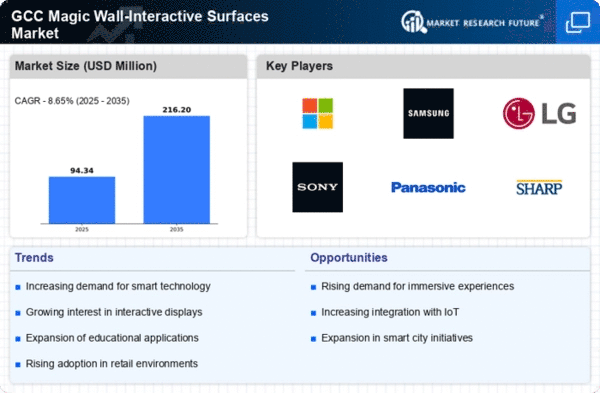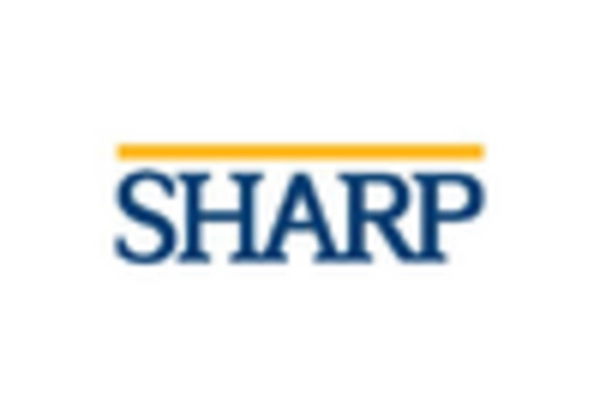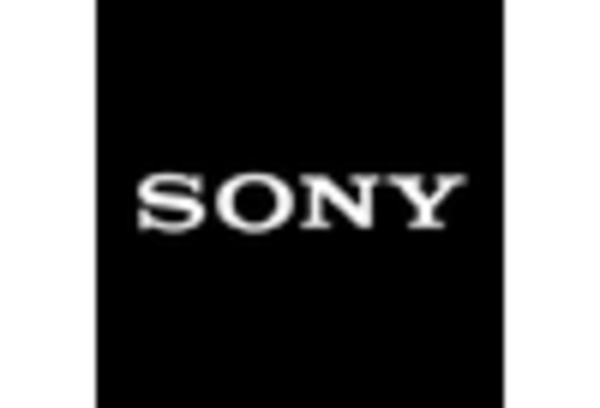Growth in the Education Sector
The education sector in the GCC is witnessing a transformation, with an increasing emphasis on technology-enhanced learning environments. The magic wall-interactive-surfaces market is poised to capitalize on this trend as educational institutions adopt interactive surfaces to facilitate collaborative learning and enhance student engagement. Recent data indicates that educational technology spending in the region is expected to reach $1 billion by 2026, with a significant portion allocated to interactive solutions. This shift towards modernized classrooms is likely to drive demand for magic wall-interactive surfaces, positioning them as essential tools for educators aiming to create dynamic and interactive learning experiences.
Government Initiatives and Support
Government initiatives in the GCC are playing a pivotal role in the growth of the magic wall-interactive-surfaces market. Various national strategies emphasize the importance of technology in enhancing public services and infrastructure. For instance, investments in smart city projects are creating opportunities for the deployment of interactive surfaces in public spaces, such as transportation hubs and government buildings. These initiatives not only promote technological adoption but also aim to improve citizen engagement and service delivery. As a result, the magic wall-interactive-surfaces market is likely to benefit from increased funding and support, fostering innovation and expansion within the industry.
Increased Focus on Digital Signage
The magic wall-interactive-surfaces market is benefiting from the growing emphasis on digital signage across various industries in the GCC. Businesses are increasingly utilizing interactive surfaces to convey information, promote products, and enhance customer experiences. The digital signage market in the region is projected to grow at a CAGR of 12% over the next few years, indicating a robust demand for innovative display solutions. As companies seek to leverage technology for effective communication, the integration of magic wall-interactive surfaces into their marketing strategies is likely to become more prevalent, thereby driving growth in the industry.
Advancements in Display Technologies
Advancements in display technologies are significantly influencing the magic wall-interactive-surfaces market. Innovations such as OLED and LCD technologies are enhancing the visual quality and interactivity of surfaces, making them more appealing to consumers and businesses alike. As these technologies become more affordable and accessible, the adoption of magic wall-interactive surfaces is expected to rise. The market is likely to see a shift towards higher resolution displays and more responsive touch interfaces, which could enhance user experience and engagement. This technological evolution is anticipated to create new opportunities for growth within the magic wall-interactive-surfaces market.
Rising Demand for Interactive Solutions
The magic wall-interactive-surfaces market is experiencing a notable surge in demand for interactive solutions across various sectors in the GCC. Businesses are increasingly recognizing the value of engaging customers through immersive experiences. This trend is particularly evident in retail environments, where interactive surfaces can enhance product displays and customer interaction. According to recent estimates, the market is projected to grow at a CAGR of approximately 15% over the next five years, driven by the need for innovative marketing strategies. As companies seek to differentiate themselves, the adoption of magic wall-interactive surfaces is likely to become a key component of their customer engagement strategies, thereby propelling the market forward.

















